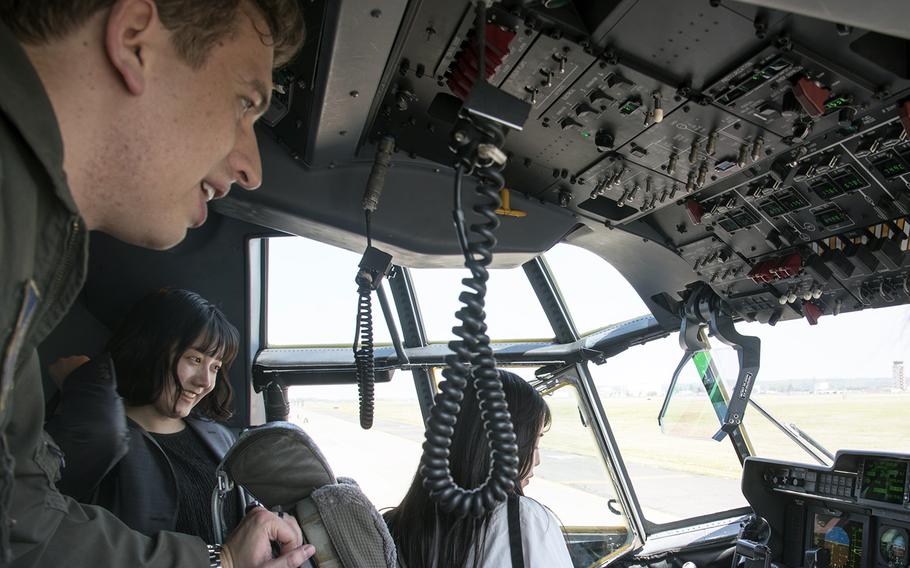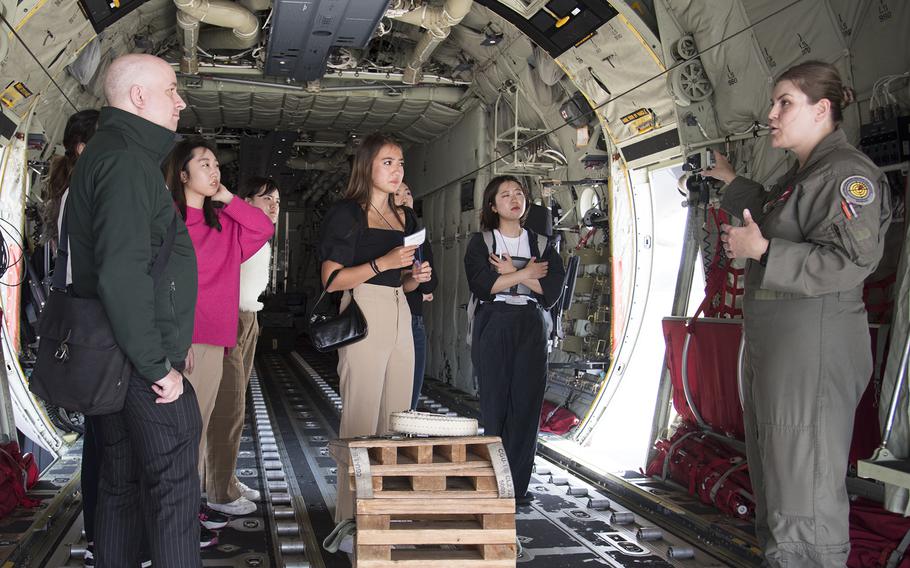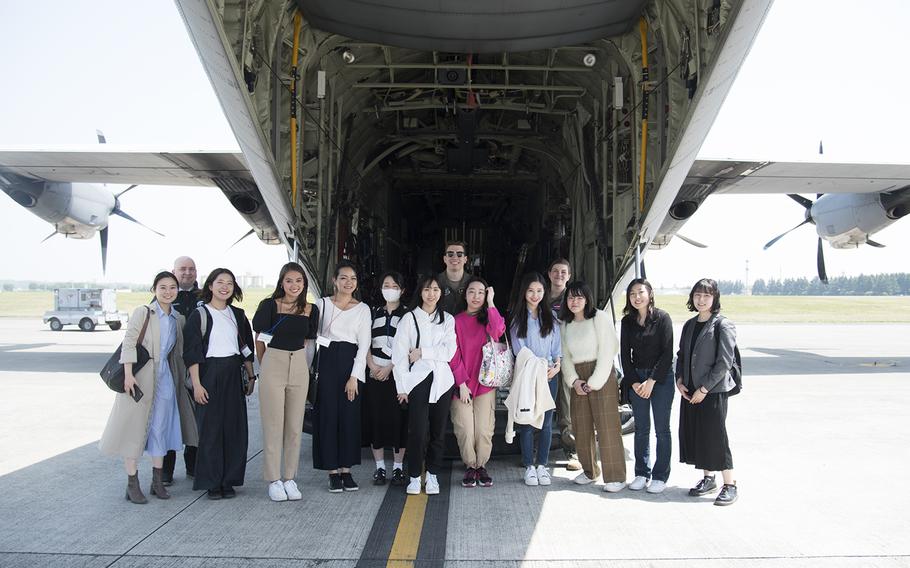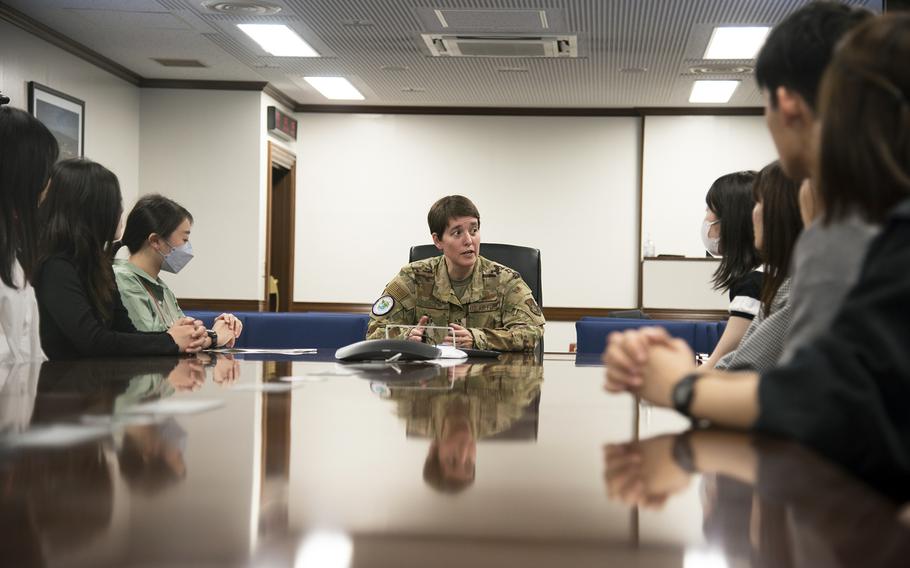
Air Force Capt. Alex Atwood, a pilot for the 36th Airlift Squadron, gives Japanese university students a tour of a C-130J Super Hercules at Yokota Air Base, Japan, Thursday, April 20, 2023. (Kelly Agee/Stars and Stripes)
YOKOTA AIR BASE, Japan — Yosuke Tanigo, an economics student from Ritsumeikan University in Kyoto, made his first trip inside a U.S. military installation on Thursday.
He and 21 other Japanese university students toured this airlift hub in western Tokyo as part of the Ambassador Youth Council program run by the American Consulate General Osaka-Kobe. The program gives select university students firsthand access to U.S. military and diplomatic experts to learn about Japan’s relationship with the United States.
“I wanted to learn more about the United States and U.S alliance and what I can do to help build that relationship,” said Tanigo, 21.
The students, all from Japanese universities in central Japan, spoke with senior leaders at Yokota and toured a C-130J Super Hercules and a UH-1 Iroquois, or Huey. This is the sixth year that students in the program have toured the base.

Air Force Master Sgt. Toni Odom, a loadmaster for the 36th Airlift Squadron, gives Japanese university students a tour of a C-130J Super Hercules at Yokota Air Base, Japan, Thursday, April 20, 2023. (Kelly Agee/Stars and Stripes)
For many, like Tanigo, it was their first time inside the fence at a U.S. installation.
“I also had a great time touring the aircraft today and being able to go inside the aircraft and see things that I have never seen before in person,” he said.
During the six-month program, the students hear from speakers from across the U.S. Embassy and U.S. military in Japan, Neal Murata, director of public engagement and communication for the consulate, told Stars and Stripes on Thursday. Topics include environmental cooperation and space exploration and cooperation.
At Yokota, they learned about military cooperation between the U.S. and Japan, Murata said.
“For us, it's important to reach out to the next generation who might not have never gone to the United States before and only know the United States through things like movies or other types of media,” he said. “So we really want this younger new generation, who we've selected very carefully, to have a better understanding of why this relationship is so important.”

Japanese university students pose behind a C-130J Super Hercules during a tour of Yokota Air Base, Japan, Thursday, April 20, 2023. (Kelly Agee/Stars and Stripes)
The tour started with a brief on Yokota’s mission from Col. Julie Gaulin, vice commander of the 374th Airlift Wing. She also answered the students’ questions.
“Thanks for caring about the U.S.-Japan relationship,” Gaulin told the visitors. “I think that we are better together. Whether you wear a uniform, you're in an academic center, or you work for the government, we need everyone because all those different perspectives are so important.”
After the brief, the students headed to the flight line to tour military aircraft.
Master Sgt. Toni Odom, a loadmaster for the 36th Airlift Squadron, talked about her job, her experiences in the U.S. military and the exercises her squadron does with the Japan Self-Defense Forces.
A female Japanese student asked Odom about her experiences as a woman in the military, Odom said. The number of women serving in the military has grown throughout the years along with opportunities in leadership, she said.
“I really hope, overall, they took away a good grasp of what we do here on Yokota,” she told Stars and Stripes. “And I hope that I have inspired some of them to pursue their dreams in aviation.”

Air Force Col. Julie Gaulin, vice commander of the 374th Airlift Wing, meets with Japanese university students during a tour of Yokota Air Base, Japan, Thursday, April 20, 2023. (Kelly Agee/Stars and Stripes)